Counting back to Kona: 2018 – Madame Pele offers a 40th surprise
the 40th anniversary of the Ironman World Championship offered a pleasant surprise - the most forgiving conditions in the race's history
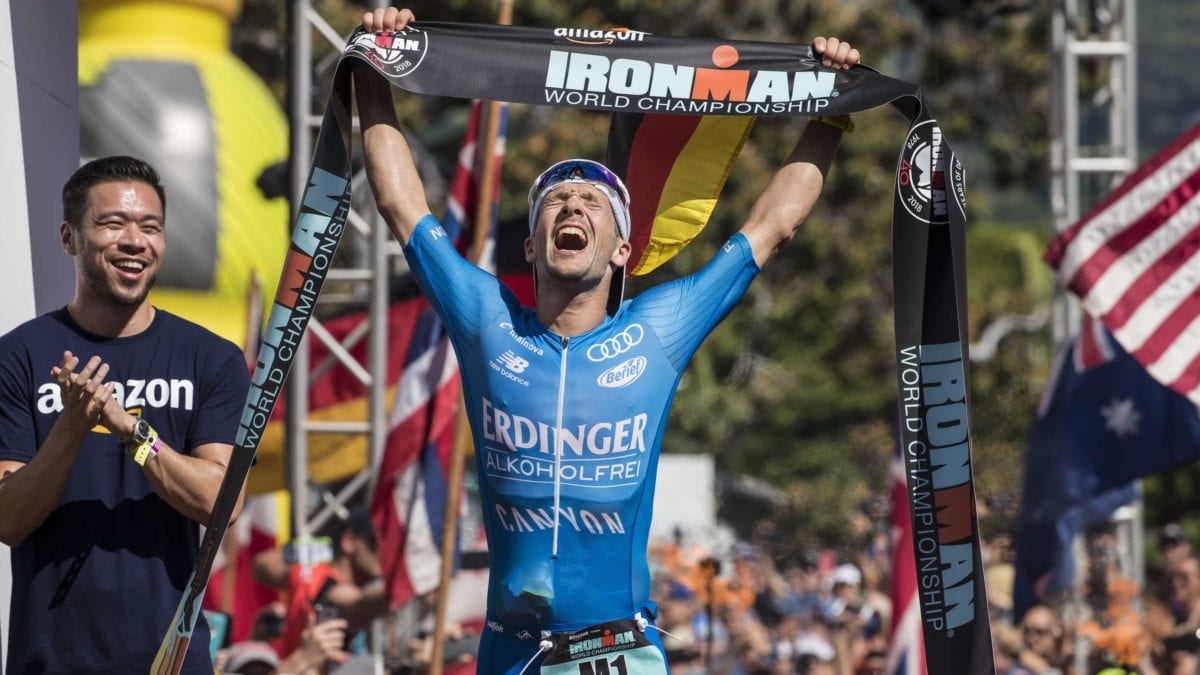
Heading into this year’s 40th anniversary Ironman World Championship in Kailua-Kona, Hawaii, it appeared that only some sort of disaster would stop Jan Frodeno and Daniela Ryf from taking the titles. Frodeno had dominated his competition at every race he’d entered this year, besting last year’s Kona runner-up Lionel Sanders at Ironman 70.3 Oceanside, defending Kona champion Patrick Lange at the Ironman European Championship in Frankfurt and winning a classic “battle of the greats” at the Ironman 70.3 World Championship in Nelson Mandela Bay, South Africa, beating eight-time world champion Javier Gomez and two time Olympic gold medalist Alistair Brownlee.
Somehow, Ryf was even more impressive, winning the Ironman in Frankfurt by a whopping 26 minutes, beating three-time Kona champ Mirinda Carfrae at Ironman 70.3 Gdynia by over 20 minutes (over a half-distance race, no less) and besting last year’s Kona runner-up, Lucy Charles, at the Ironman 70.3 World Championship, despite a broken zipper in her tri suit that made it look like she had a parachute flapping behind her as she rode her bike.
Disaster did indeed strike Frodeno, who got off the plane after his big win in South Africa in excruciating pain. An MRI revealed he had a sacral stress fracture, which signalled the end of his brilliant season.
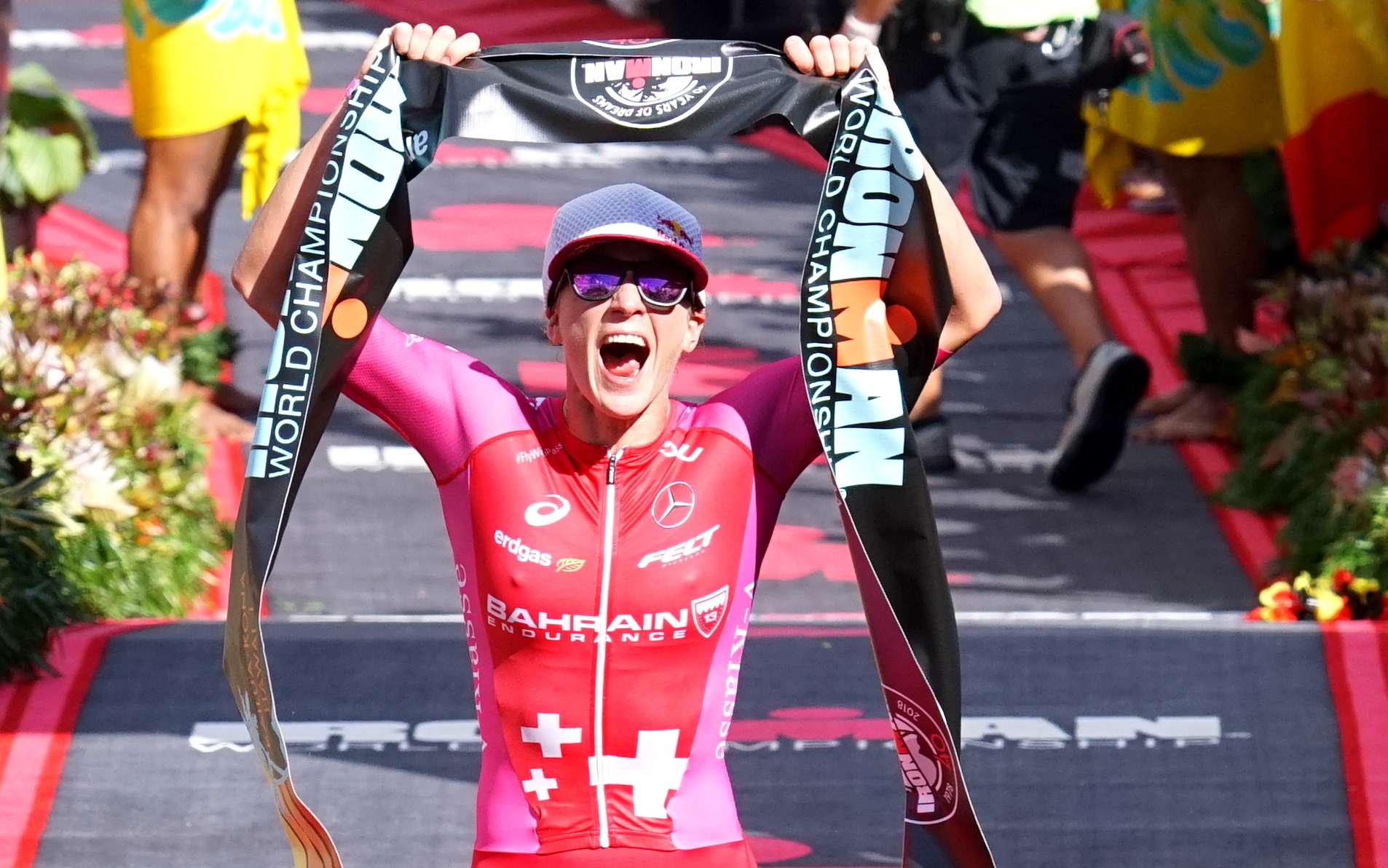
Ryf, on the other hand, seemed all set to dominate yet again. To hear her tell the story race week, though, there was little chance of the day being a blow out. “I’m looking forward to another tough battle,” she kept saying. “Anything can happen on race day,” was another oft-heard line from the three-time Swiss champ.
In addition to her prodigious triathlon talents, Ryf might just need to take up a career reading tarot cards. Something did happen on race day – just before the start of the women’s pro race she was stung by a jellyfish.
In addition to the intense pain, she suddenly found herself wondering if she might even be able to continue the race. “I was very, very close to dropping out,” Ryf said after the race. “I really didn’t know if I was going to make it, or if I was going to drown. I could barely lift my arms and they started to get numb. I was also a little bit afraid. I didn’t know if I was allergic. It was just painful and I was getting slower and slower. And then I thought the pain is going to go away eventually and, maybe, in five hours, I won’t feel it any more. I thought about lots of things – my team, who did so much this week and I thought I can’t just let them down. And then I thought about Jan [Frodeno], who didn’t give up last year. And I thought about little kids who might be watching the race and I thought, ‘As a champion, you have to be a role model and you cannot just give up.’”
While Ryf struggled through the water, the woman considered to be her main competition, Lucy Charles, was stroking through the relatively calm Pacific waters at record-setting pace. Charles swam for Great Britain’s national open-water swim team and narrowly missed making the Olympic games in 2012. At 25, she was the youngest women’s pro in the race, but her age has hardly slowed her down when it comes to impressive Ironman races. She won her first pro race, Ironman Lanzarote, three years ago, finished second in Kona last year and dominated the Ironman African Championship in South Africa last April. Charles took advantage of the near-perfect conditions in the water to break the swim course record that had stood for 19 years, finishing the swim in 48:13. Normally a strong swimmer who would typically trail Charles by four or five minutes, Ryf would come out of the water almost 10 minutes behind, struggle through transition and then set out in pursuit of her rival.
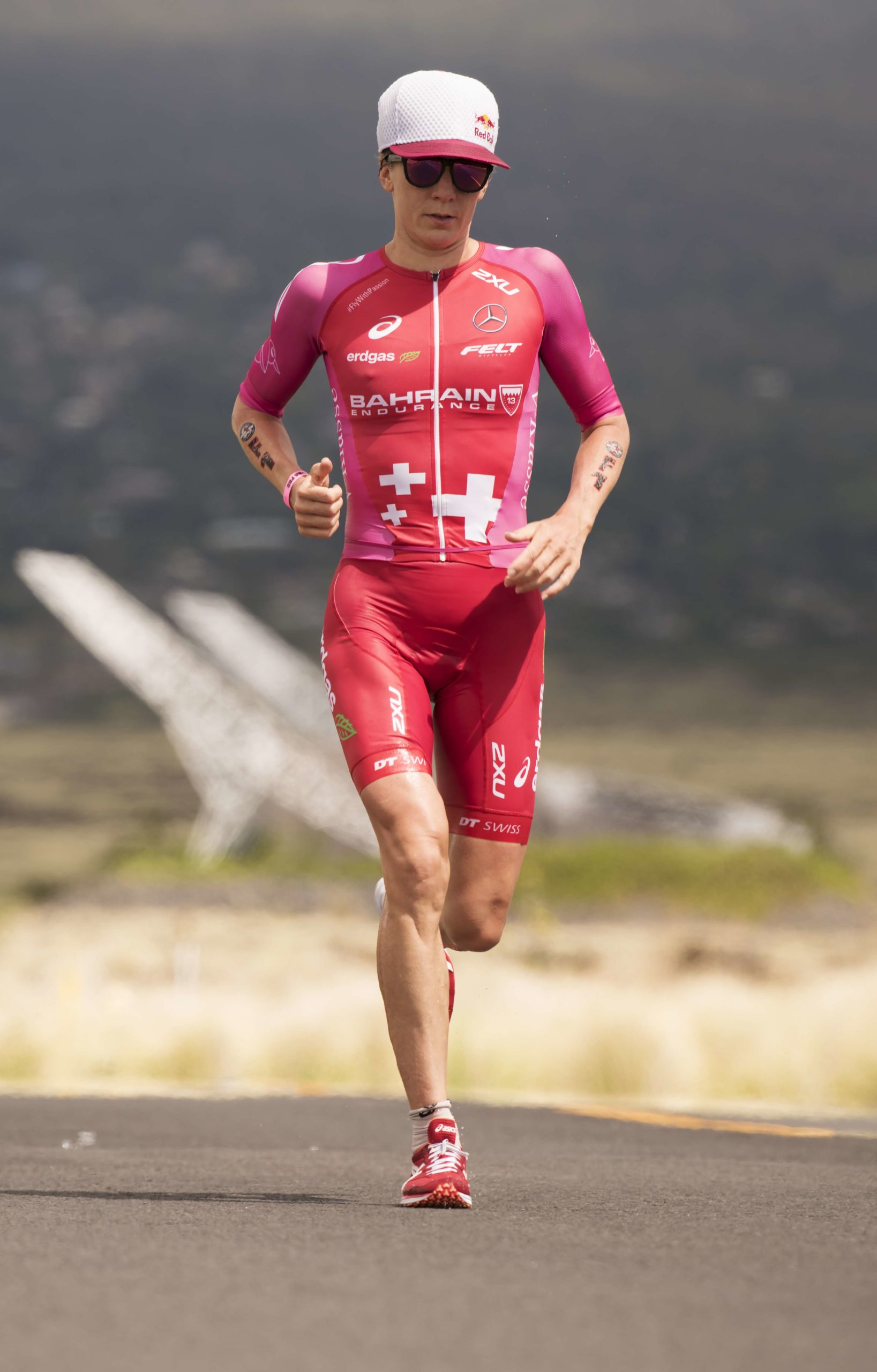
As much as it was expected that Ryf would be the champion, Ironman fans were looking forward to this year’s race because it featured possibly the most competitive women’s field ever assembled for a long-distance race. As Ryf charged through the women’s field through the early stages of the bike, she found herself passing a who’s who of Ironman racing, many of whom were riding in close proximity, as there suddenly seemed to be a new dynamic – the women in this field were strong in all three disciplines.
As good as all those women are, though, they’ve got nothing on Ryf. As the pain from the sting subsided, Ryf steadily gained on Charles, dropping all the women who tried to stay with her in the process. Ryf disposed of all the women considered to be amongst the best cyclists in the sport – names such as Heather Jackson, Sarah Crowley, Michelle Vesterby – in short order. And she just got stronger as the day progressed.
Enjoying the unique “next-to-no-wind” conditions that have never been seen during the race before, Ryf flew through a 4:26 bike split, riding the last 70 km of the course faster than all but two of the men. She came off the bike over two-minutes ahead of Charles, 12 minutes up on an injured Corinne Abraham, and about 16 minutes up on the rest of the women’s main contenders and top runners.
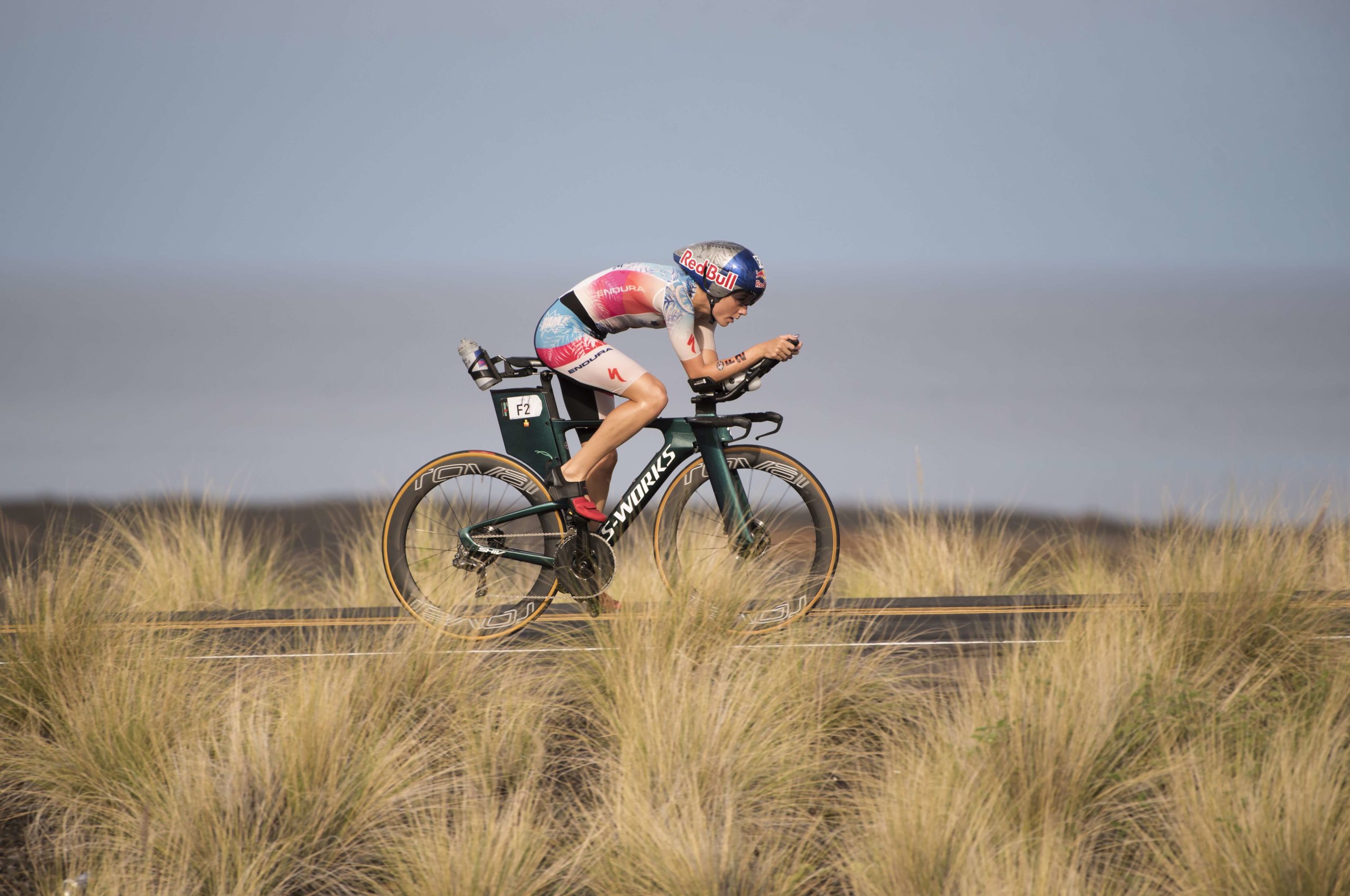
Suddenly Ryf wasn’t just in control of the race; that bike split had put her in reach of not only a course record (her own from two years ago), but the fastest time ever at an Ironman race. Ryf cruised through a 2:57 marathon, finishing the race in an incredible 8:26:16. Charles was never really threatened for second, but there were lots of fireworks for third out on the Queen K and into the famed Energy Lab. Without much wind the conditions were extremely hot during the run, which made for some interesting dynamics, as some of the fastest athletes in the sport succumbed to the conditions. Germany’s Anne Haug and American Sarah True, both Olympians and Kona rookies, would end up taking third and fourth, while Carfrae, who had delivered baby Isabelle into the world 13 months before the race, continued her impressive comeback by taking fifth.
The gods might just have been playing games with Ryf, giving her a bit of a challenge to overcome to make this year’s race that much more satisfying. It seemed to have worked – Ryf was energized much more than we’ve seen her in her previous three wins on the Big Island. Earlier in the week Ryf had said that her goal was to finish the race within thirty minutes of the top men’s time. She managed that, but at the post-race press conference she warned everyone that at the finish line she’d mentioned to Charles that they needed to keep pushing each other to faster and faster times – she wanted the deficit to come down to 20 minutes.
That’s frightening news for both her competition and the men who will have to try to hold her off in future.

Lange’s Four-Minute Mile
Ever since Germany’s Lothar Leder broke the eight hour mark for a full-distance race 22 years ago, a sub-eight-hour day in Kona has been considered the sport’s equivalent of the four-minute mile goal that Roger Banister managed to overcome back in the 1950s. If there ever was going to be a day when that might happen, this year’s championship was it. Perfect weather conditions combined with a stellar field seemingly determined to push the pace throughout the day laid the foundation for another new record.
Australian Josh Amberger led the way out of the water in a new course-record swim time (former pro Jan Sibbersen, racing in the men’s 40 to 44 age group, would break Amberger’s record a few minutes later with a 46:30 split), but had some company out of the water. A huge group of contenders, including German champions Lange (last year) and Sebastian Kienle (2014), were just over two minutes down, while Canadian favourite Lionel Sanders struggled in the water, coming out more than six minutes behind Amberger and the lead group. After one of the best swims of his life, Kienle entered transition to find a flat rear tire, which required him to switch wheels. Unfortunately, the German would never really factor in the race again and would eventually drop out during the run.
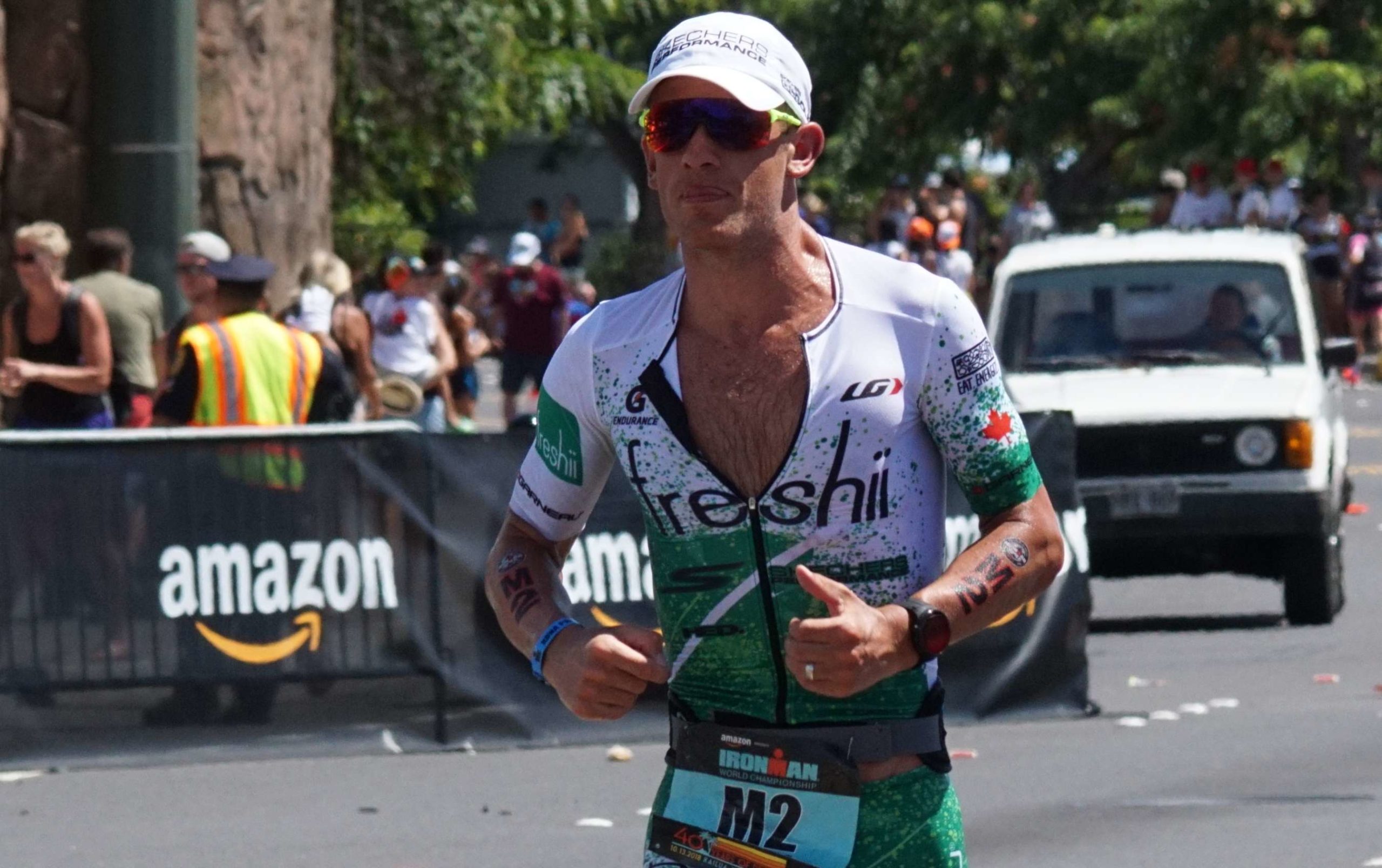
Out on the bike course American Andrew Starykowicz, who has ridden under four hours for a full-distance bike split a few times, blasted to the front alongside Amberger, but was joined by Australian former pro cyclist Cameron Wurf, who would take control of the bike and eventually drop Starykowicz and Amberger and ride solo into T2 in a new course-record bike split of 4:09.
About six minutes behind came a huge chase group that had been driven by Germany’s Andi Dreitz, a teammate of Lange’s, which left many to wonder if team tactics were coming into play in the race. Lange came off the bike among some of the best runners in the sport, including New Zealand’s Braden Currie, American Tim O’Donnell and Belgium’s Bart Aernouts. A few minutes later came Javier Gomez, who was competing in his first Ironman World Championship, but was still considered by many to be a threat for the win. Last year’s third-place finisher, David McNamee (from Scotland, of course) and Sanders were a few more minutes back.
By the six-mile point of the run things became abundantly clear – Lange was directing this train as O’Donnell and Currie gallantly tried to stay with the German. In his first Kona appearance, Lange broke Mark Allen’s run course record with a 2:39 marathon split. Last year, his run was a shade over 2:40. Wurf’s lead was shrinking rapidly, but then at eight miles, Lange “decided he didn’t want to run with us anymore,” according to O’Donnell and pulled away. He would never look back. A 2:41 marathon this time might have been his slowest on the Big Island in his three appearances, but it was more than enough to achieve a new course record and a second-straight title. And he didn’t just break the eight-hour barrier, he smashed it with a 7:52:39 finishing time. Aernouts would run his way to second while McNamee would take third for the second straight year.
Sanders, who started the marathon alongside McNamee, would fade dramatically and eventually finish 28th in 8:30:34, a devastating finish for the man many considered to be the pre-race favourite.
As in the women’s race, Patrick Lange took full advantage of the perfect race conditions to take his spot in history – the first man to break triathlon’s equivalent of the four-minute mile. Frodeno was left to wonder what might have been, knowing full well that conditions like this year’s might not come again for many years to come
Comeback Time in Kona
Matt Russell was riding down the Queen K last year when a minivan was directed to cross the road ahead of him. The American hit the van at close to 50 km/h, sustaining some major injuries. Russell returned from hospital here in Hawaii to a household that had, just a few weeks earlier, welcomed a baby girl to the family. His wife was also going through some health issues, making the family situation more than a little challenging as Russell tried to recover from his injuries.
Russell finished third at Ironman Mont-Tremblant in August, which left him just short of the required points to qualify for the Ironman World Championship, but received a special invite from Ironman CEO Andrew Messick to attend the race. Russell more than lived up to that invitation – he finished sixth, just four seconds behind the fifth-place finisher, New Zealand’s Braden Currie.
A few days before last year’s Ironman World Championship, Great Britain’s Tim Don was in a bike accident and broke his neck. He would spend much of the next few months with a halo screwed into his skull to keep his vertebrae aligned as he recovered from the accident. Don returned to racing by completing the Boston Marathon in April and started racing triathlon events in June with a win at Ironman 70.3 Costa Rica and a ninth-place finish at Ironman Hamburg. Don returned to the Big Island and was an emotional favourite with the fans along the course. He finished the race in 8:45:17.
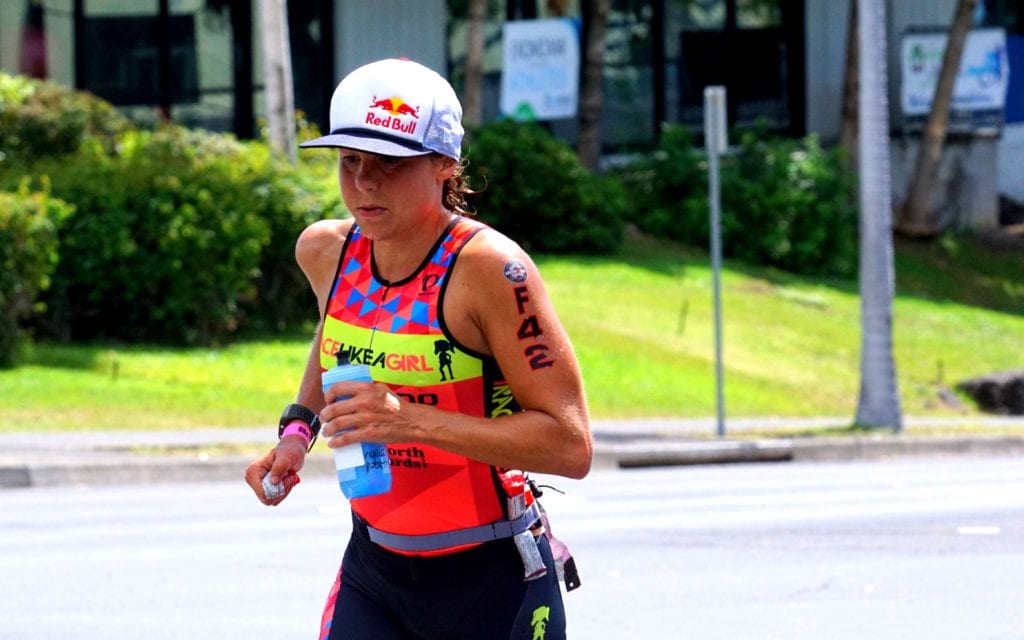
Angela Naeth’s Unbelievable Eighth (8:57:34)
I can’t put it into words. My boyfriend [Tim Snow], who is also my coach, said, “You just have to have a strong race, you’re such a strong athlete.” Those words stuck with me. Right from the get-go in the swim I repeated, “Be strong, be strong.” The swim was really interesting; there was a big pack of us. I haven’t really been in a pool for the last four months. I’ve just been doing open-water swimming, and I think that’s really helped me to be strong in the water.
For the first few miles on the bike, there was a big group of girls. I descend really well, so I tried to get up to the front over the first three or four miles [up the first climb up Kuakini Highway]. The girls were riding so strong. I think Mirinda Carfrae passed me at mile 40. She had a really strong bike, too. Finally, there was a big group of us climbing up to Hawi, and I thought, “I have to go, I don’t know what I can do on the run.” I got up to Hawi and there was me, Kaisa [Sali] and Rachel McBride at the top and we all took turns at the front on the descent. [For the last] 30 miles, I was in front the whole way. People caught up, but I kept riding really strong.
On the run, I honestly had no idea what I could do. I got dropped pretty early, but I got stronger and stronger, and at mile 14, I started seeing people coming back to me.
I’m just overwhelmed. From where I’ve been – in April, I honestly couldn’t lift my legs – to come here and place eighth after five Ironmans this year is unbelievable to me. Not in my wildest dreams would I have expected to do what I did today. I am just so happy to be back and healthy.—Angela Naeth
Canadians on The Podium
At the Ironman World Championship the top five in each age group are acknowledged on the podium. Here are the Canadian age group competitors who earned themselves a traditional Umeke bowl for their efforts on the Big Island
Women
Yvonne Timewell, 50 to 54, second, 10:26:05
Cullen Goodyear, 70 to 74, second, 14:36:14
Valerie Gonzales, 70 to 74, fifth, 15:27:44
Men
Pierre Heynemand Junior, 50 to 54, fourth, 9:24:03
Len Ireland, 60 to 64, third, 11:39:07
Bob Knuckey, 70 to 74, first, 11:55:04
This story originally appeared in the November/December issue of Triathlon Magazine
